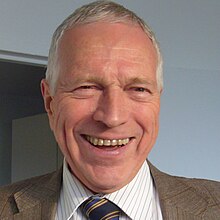Edmund Phelps | |
|---|---|
 Phelps in 2017 | |
| Born | July 26, 1933 Evanston, Illinois, U.S. |
| Nationality | American |
| Education | Amherst College (BA) Yale University (PhD) |
| Academic career | |
| Field | Macroeconomics |
| Institution | RAND Corporation Cowles Foundation University of Pennsylvania Columbia University |
| Doctoral advisor | James Tobin Arthur Okun |
| Doctoral students | Gylfi Zoega Hian Teck Hoon |
| Influences | Paul Samuelson William Fellner Thomas Schelling John Rawls |
| Contributions | Microfoundations of macroeconomics Expectations in wage and price-setting Natural rate of unemployment Statistical discrimination Structural slumps Imagination in innovating Golden Rule rate of saving |
| Awards | Nobel Memorial Prize in Economic Sciences, 2006 Chevalier de la Legion d'Honneur, 2008 Pico Mirandola Prize, 2008 Global Economy Prize, 2008 China Friendship Award, 2014 |
| Academic background | |
| Thesis | A test for the presence of cost inflation in the united states economy, 1955-1957 (1959) |
| Part of a series on |
| Macroeconomics |
|---|
 |
Edmund Strother Phelps (born July 26, 1933) is an American economist and the recipient of the 2006 Nobel Memorial Prize in Economic Sciences.
Early in his career, he became known for his research at Yale's Cowles Foundation in the first half of the 1960s on the sources of economic growth. His demonstration of the golden rule savings rate, a concept related to work by John von Neumann, started a wave of research on how much a nation should spend on present consumption rather than save and invest for future generations.
Phelps was at the University of Pennsylvania from 1966 to 1971 and moved to Columbia University in 1971. His most seminal work inserted a microfoundation, one featuring imperfect information, incomplete knowledge and expectations about wages and prices, to support a macroeconomic theory of employment determination and price-wage dynamics. That led to his development of the natural rate of unemployment: its existence and the mechanism governing its size. In the early 2000s, he turned to the study of business innovation.
He is the founding director, since 2001, of Columbia's Center on Capitalism and Society. He was McVickar Professor of Political Economy at Columbia from 1982 to 2021. On January 1, 2022, his title changed to McVickar Professor Emeritus of Political Economy.